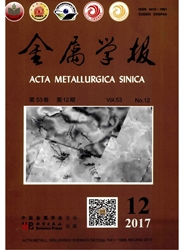

 中文摘要:
中文摘要:
采用电弧离子镀技术制备了普通NiCoCrAlYSi涂层和梯度NiCoCrAlYSi涂层,分析了2种涂层的组织及结构,对比研究了2种涂层分别在1000℃到室温的循环氧化行为和900℃的高温热腐蚀行为.结果表明,普通涂层由g/g′相、b相和a-Cr相组成,梯度涂层外层富Al,内层富Cr,Al和Cr在涂层中呈梯度分布.循环氧化过程中梯度涂层外层充足的Al源维持表面Al_2O_3膜的形成和修复,界面处富Cr(W,Re)相抑制涂层与基体的互扩散,表现出良好的抗循环氧化性能.热腐蚀过程中,NaCl的存在加速了腐蚀的进程,2种涂层出现不同程度的内氧化和硫化,普通涂层表面形成了非保护性的NiAl_2O_4尖晶石和NiO,梯度涂层中外部富Al内部富Cr的梯度分布,减缓了热腐蚀进程.
 英文摘要:
英文摘要:
MCrAlY(M=Ni and/or Co) coatings are widely used as overlays or bond coats for thermal barrier coatings due to their good performance against high temperature oxidation and hot corrosion. Usually, high Al content in the MCrAlY coatings can benefit the performance and lifetimes of the coatings. However, MCrAlY coatings usually contain only restricted Al content because high Al content might lead to brittleness and potential crack. Design of gradient coating can be used to solve the problem, since it can provide a balance between high Al content and high stress bearing ability. Therefore, much attention has been paid to coatings with gradient structures, and these coatings show good oxidation and corrosion resistance. In this work, a gradient and a conventional Ni CoCrAlYSi coating were prepared by arc ion plating technique and subsequent annealing treatment. Cyclic oxidation tests of the two coatings were carried out between room temperature and 1000 ℃. The hot corrosion tests of the coatings were performed in two different mixed salts of 75%Na_2SO_4+25%K_2SO_4and 75%Na_2SO_4+25%Na Cl(mass fraction) at 900 ℃. The results indicated that the gradient coating possessed a graded distribution of Al-rich outer layer and Cr- rich inner layer after annealing treatment, and it showed better performance of re- healing alumina scale due to its possession of more b phase as Al reservoir during the cyclic oxidation. The degradation process of the gradient coating was favorably retarded by the formation of Cr(W, Re)- rich precipitates in the interdiffusion zone. In sulphates, the two coatings showed good corrosion resistance. The presence of NaCl aggravated the corrosion extent of the two coatings. Compared with the conventional coating, the gradient coating postponed the formation of internal oxidation and sulfidation, resulting from the gradient distribution of Al-enriched outer layer and Crenriched inner layer.
 同期刊论文项目
同期刊论文项目
 同项目期刊论文
同项目期刊论文
 Composite coatings with and without an in situ forming Cr-based interlayer: Preparation and oxidatio
Composite coatings with and without an in situ forming Cr-based interlayer: Preparation and oxidatio 期刊信息
期刊信息
